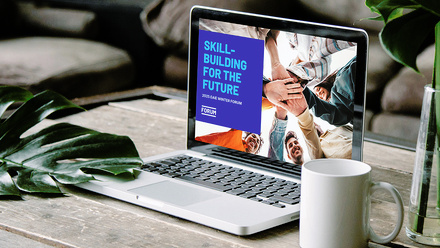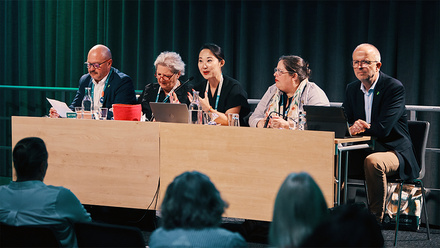Don’t mistake my kindness for weakness: Leading with kindness to foster an inclusive environment

What comes to mind when you think about being kind in the workplace? Thinking of others? Forgiving mistakes? Praising good work? Being supportive? These sound like qualities of a great leader so why is kindness often seen as a weakness, a vulnerability? Perhaps it’s because kindness is mistaken for ‘being nice’ and people who are seen as ‘nice’ often avoid making difficult decisions or dealing with conflict for fear of upsetting others. These aren’t qualities we typically associate with strong leadership.
Or maybe because we are used to a hierarchical, traditional working culture, where leadership is more about ‘command and control’ — being task-focused rather than people-focused — and where leaders might feel that showing kindness diminishes their authority. In this blog, however, we promote kindness as a strength — a leadership superpower that fosters a broader culture of respect and inclusion. Furthermore, we show how the European University Alliance Young Universities for the Future of Europe (YUFE) embeds kindness in their ‘Creating a Culture of Inclusion’ leadership development workshops.
Defining leadership
First, let’s consider what makes a leader. A leader is a strategist, a communicator, a delegator, a networker, a motivator, a role model, an innovator and so much more. And what comes to mind when you think about the qualities of a great leader? Having a clear vision? Inspiring others? Having good judgement? Problem-solving skills? Of course, these qualities are important, but we believe it’s just as much about how our leaders do something, as it is about what they do. Leaders are only leaders if they have people to lead, and their success depends on whether those they lead come along with them on the journey, buy into the vision and invest their energy in doing so. Their willingness to follow is influenced by many factors — one of the most important being how they are treated by their leader.
Kind leaders care about the well-being and growth of the people they lead. They are compassionate, empathetic, and helpful, balancing the needs of individuals with organisational goals.
Now, let’s consider what kindness means in the context of leadership. Kind leaders care about the well-being and growth of the people they lead. They are compassionate, empathetic, and helpful, balancing the needs of individuals with organisational goals. However, this does not mean however that kind leaders have low expectations, avoid making tough decisions, ignore conflict or are easily led. Kind leaders encourage continuous improvement by providing constructive feedback and creating opportunities for people to develop new skills and innovate. They make decisions that create positive change, even if that means sacrifices or difficult choices. They are honest and transparent when communicating those decisions to those involved and affected stakeholders. They see conflict resolution as necessary for organisational success and handle it with a values-led approach. They are open-minded, seek a wide range of views, and consider different perspectives, but they are not easily swayed.
kindness is the leadership superpower that enables an inclusive environment.
The case for kindness
Kindness is about behaviour, not personality. But how does it relate to creating an inclusive environment? At YUFE, we define an inclusive environment as ‘one in which all members feel respected by, and connected to, one another. They feel a sense of belonging’. There are several components to this, including:
-
Developing policies that reflect organisational values and a commitment to fully implementing those policies when needed.
-
Building knowledge of, and commitment to, equity, diversity and inclusivity.
-
Fostering a community comprised of people from different backgrounds, identities and experiences.
-
Ensuring that the environment (both physical and virtual) is designed to include, rather than exclude, those with diverse physical or mental abilities.
-
Creating psychologically safe environments, where asking for and giving help is encouraged, people feel valued and are sure that their diverse experiences matter. Open, honest conversations are welcomed, and mistakes and failures are seen as part of the learning process.
So, can we achieve this without kindness? To some extent yes. But then again, it comes down to how things are done. For example, as leaders, we can approve a proposal to make a building more accessible. But if we do this without kindness, the change may feel insincere to those who will benefit from it. Or we can address a piece of work that didn’t meet expectations by telling the person it’s a learning experience - but if we do that without kindness, it is likely to feel demotivating rather than encouraging.
Treating others with kindness, even when delivering difficult messages or dealing with someone we think is being unreasonable, not only increases the chances of a positive outcome but also makes us happier and more resilient
We believe that kindness is the leadership superpower that enables an inclusive environment. It’s the thread that ties our good intentions together, allowing us to connect with others and build meaningful relationships. And it’s a choice — we can choose to behave kindly and encourage kindness, or we can choose not to. Treating others with kindness, even when delivering difficult messages or dealing with someone we think is being unreasonable, not only increases the chances of a positive outcome but also makes us happier and more resilient — two key qualities for any leader. It’s a win-win! This is why the YUFE’s Community Code of Conduct, which defines the attributes of a YUFE community member, has ‘acts kindly towards others’ as its first attribute. We use the Code of Conduct as the foundation for all our ‘Creating a Culture of Inclusion’ leadership development workshops, aligning these attributes with the factors that contribute to creating a culture of inclusion. This reflects our commitment to empowering every member of the YUFE community to take personal responsibility for upholding the YUFE values — and doing so with kindness.
We hope that we’ve convinced you that kindness should never be mistaken for weakness. It is a powerful tool for creating cultural change and we all need kindness in our lives.






